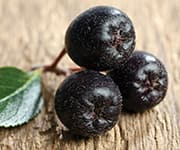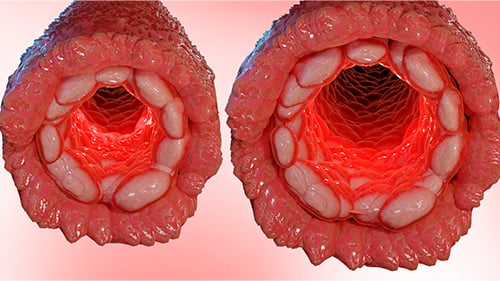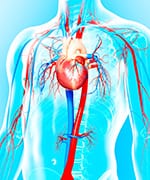Life Extension Magazine®
Nitric oxide plays a major role in the dilation of blood vessels.
It is vital for maintaining healthy blood flow,1 blood pressure,2 and platelet function.1
The problem is that internal nitric oxide production decreases with age.3,4
Low nitric oxide is associated with an increased risk of cardiovascular diseases, 4 cognitive decline, and dementia.4,5
Nitric oxide has a short half-life. It gets metabolized and quickly eliminated from the bloodstream.6
Aronia berry and a long-acting form of L-arginine each work to boost and sustain higher nitric oxide production.
Importance of Nitric Oxide
Nitric oxide is produced by nearly every cell in the body.7,8 It’s needed to dilate blood vessels, allowing them to open up to increase blood flow.9
When we exercise9,10 or travel to higher altitudes,11 our bodies release more nitric oxide to relieve blood vessel constriction.10
Nitric oxide is also produced in our nasal cavity when we breathe through our nose. This helps to combat viruses and bacteria.12,13
The 1998 Nobel Prize in Physiology or Medicine was awarded to scientists who discovered its role in maintaining cardiovascular health.14,15
With age, nitric oxide levels decline. This can result in endothelial dysfunction, when these cells lining the inner walls of arteries don’t work properly.4 Blood vessels can’t widen when needed, reducing blood flow.
That can lead to high blood pressure, atherosclerosis, abnormal clotting, and increased risk of heart attacks, strokes, and sudden cardiac death.
Endothelial dysfunction also increases the risk of dementia and cognitive dysfunction.3,16,17
Long-Acting Form of L-Arginine
For the body to produce nitric oxide, no compound is more important than the amino acid L-arginine. It is the direct precursor nutrient that blood vessels use to make nitric oxide.
In a clinical trial, patients with high blood pressure were given either a placebo or a single dose of L-arginine. Measurements were taken of flow-mediated dilation, how much a blood vessel dilates (widens) in response to an increase in blood flow.
Participants who received the placebo had no change. But those given L-arginine had an average improvement in flow-mediated dilation from 1.7% to 5.9%.18
Considering that each 1% improvement in flow-mediated dilation correlates with a 12% lower risk of cardiovascular events, this suggests a potential 50% reduction in risk for cardiovascular events.19,20
A drawback with L-arginine has been that it takes about an hour to take effect and it does not stay in the bloodstream for long.21
But scientists have developed a more bioavailable (more enters circulation and can have an effect) form of L-arginine called inositol-stabilized arginine silicate. It works within just 15 minutes and sustains L-arginine levels for up to six hours.21,22
Flow-Mediated Dilation
Flow-mediated dilation is the change in diameter of blood vessels in response to increased blood flow (such as exercise or high blood pressure).
It can assess vascular function and cardiovascular risk in an individual.
Research indicates that for every 1% increase in brachial artery flow-mediated dilation, the risk of cardiovascular events is reduced by 12%.Inositol-stabilized arginine silicate appears to keep L-arginine levels higher for longer periods because it inhibits the enzyme arginase, which breaks down L-arginine.23
This stabilized L-arginine form has demonstrated clinical benefits that standard L-arginine hasn’t been shown to achieve.
In three recent randomized, controlled trials, inositol-stabilized arginine silicate improved working memory, processing speed, concentration, and other measurements of cognition in young adults.24-26
Effects of Aronia Berry
Aronia berries are native to North America and resemble cranberries. They have been thought of as a superfood due to their high content of vitamin C, anthocyanins, and other polyphenols.27
Research indicates that low flow-mediated dilation of blood vessels is associated with a high risk of cardiovascular events.20 Research also suggests that aronia berries boost nitric oxide production by increasing the activation of an enzyme that converts L-arginine into endothelial nitric oxide.28
In a randomized, controlled trial, a daily intake of 500 mg of aronia whole fruit berry and extract powder for 12 weeks resulted in a 1.2% improvement in flow-mediated dilation compared to placebo.29 This corresponds to a nearly 14% reduction in the risk for cardiovascular events.19
In another clinical trial, 101 adults aged 40-60 years old were randomized to receive aronia berry extract or a placebo for 24 weeks.
Cognitive function was assessed using tests including the grooved pegboard test, in which pegs must be precisely rotated to match a slot before they can be inserted.30 This measures psychomotor speed, the ability to quickly think and then perform a motor action.
The results showed that those who received aronia berry extract daily had significantly higher scores on the test after just six weeks than those taking a placebo.
Taking aronia extract along with the new form of L-arginine may lead to even greater levels of nitric oxide production, maximizing the cardiovascular and cognitive benefits.
What you need to know
Keeping Blood Vessels Healthy
- The endothelium is a layer of cells lining the inside of blood vessels. It produces nitric oxide, a molecule that signals the vessel to dilate, allowing blood to flow through.
- With age, nitric oxide production tends to decline, contributing to endothelial dysfunction. This can increase the risk of heart attacks, strokes, cognitive decline, and dementia.
- L-arginine is a precursor the body needs to make nitric oxide. A new form, inositol-stabilized arginine silicate, improves its bioavailability and supports higher levels in the bloodstream for a longer time.
- Aronia berries help activate the enzyme that converts L-arginine into nitric oxide.
- Taking oral L-arginine improves blood vessel dilation enough to correlate with a 50% reduction in risk for cardiovascular events. It also improves several measures of cognition.
- In a clinical study, aronia berry extract also improved blood vessel dilation and significantly boosted scores on a test of cognitive function.
- Taking these two ingredients together may significantly boost nitric oxide production, reducing the risk for cardiovascular events and enhancing cognitive function.
Summary
Nitric oxide is needed to maintain the health of blood vessels. As production in the body decreases with age, the risk of cardiovascular diseases and cognitive deficits rises.
L-arginine and aronia berry extract have each been shown to increase nitric oxide production.
Research suggests that aronia berry increases the activation of an enzyme that converts the amino acid L-arginine into nitric oxide.
Clinical trials have shown that taking each has benefits for both cardiovascular and cognitive health.
Taking both together may result in ideal levels of nitric oxide production in the body for aging individuals.
If you have any questions on the scientific content of this article, please call a Life Extension Wellness Specialist at 1-866-864-3027.
References
- Bescós R, Sureda A, Tur JA, et al. The effect of nitric-oxide-related supplements on human performance. Sports Med. 2012 Feb 1;42(2):99-117.
- Biswas OS, Gonzalez VR, Schwarz ER. Effects of an oral nitric oxide supplement on functional capacity and blood pressure in adults with prehypertension. J Cardiovasc Pharmacol Ther. 2015 Jan;20(1):52-8.
- Sverdlov AL, Ngo DT, Chan WP, et al. Aging of the nitric oxide system: are we as old as our NO? J Am Heart Assoc. 2014 Aug 18;3(4).
- Torregrossa AC, Aranke M, Bryan NS. Nitric oxide and geriatrics: Implications in diagnostics and treatment of the elderly. J Geriatr Cardiol. 2011 Dec;8(4):230-42.
- Stephan BCM, Harrison SL, Keage HAD, et al. Cardiovascular Disease, the Nitric Oxide Pathway and Risk of Cognitive Impairment and Dementia. Curr Cardiol Rep. 2017 Aug 11;19(9):87.
- Thomas DD, Liu X, Kantrow SP, et al. The biological lifetime of nitric oxide: implications for the perivascular dynamics of NO and O2. Proc Natl Acad Sci U S A. 2001 Jan 2;98(1):355-60.
- Luiking YC, Engelen MP, Deutz NE. Regulation of nitric oxide production in health and disease. Curr Opin Clin Nutr Metab Care. 2010 Jan;13(1):97-104.
- Massion PB, Feron O, Dessy C, et al. Nitric oxide and cardiac function: ten years after, and continuing. Circ Res. 2003 Sep 5;93(5):388-98.
- Tschakovsky ME, Joyner MJ. Nitric oxide and muscle blood flow in exercise. Appl Physiol Nutr Metab. 2008 Feb;33(1):151-61.
- Ashor AW, Lara J, Siervo M, et al. Exercise modalities and endothelial function: a systematic review and dose-response meta-analysis of randomized controlled trials. Sports Med. 2015 Feb;45(2):279-96.
- Janocha AJ, Koch CD, Tiso M, et al. Nitric oxide during altitude acclimatization. N Engl J Med. 2011 Nov 17;365(20):1942-4.
- Jorissen M, Lefevere L, Willems T. Nasal nitric oxide. Allergy. 2001 Nov;56(11):1026-33.
- Sodano F, Gazzano E, Fruttero R, et al. NO in Viral Infections: Role and Development of Antiviral Therapies. Molecules. 2022 Apr 5;27(7).
- Pai-Dhungat JV. Nitric Oxide (NO): Molecule of the Year 1992. J Assoc Physicians India. 2015 Dec;63(12):93.
- Rabelink AJ. [Nobel prize in Medicine and Physiology 1998 for the discovery of the role of nitric oxide as a signalling molecule]. Ned Tijdschr Geneeskd. 1998 Dec 26;142(52):2828-30.
- Tarantini S, Tran CHT, Gordon GR, et al. Impaired neurovascular coupling in aging and Alzheimer’s disease: Contribution of astrocyte dysfunction and endothelial impairment to cognitive decline. Exp Gerontol. 2017 Aug;94:52-8.
- Luca M, Luca A. Oxidative Stress-Related Endothelial Damage in Vascular Depression and Vascular Cognitive Impairment: Beneficial Effects of Aerobic Physical Exercise. Oxid Med Cell Longev. 2019;2019:8067045.
- Lekakis JP, Papathanassiou S, Papaioannou TG, et al. Oral L-arginine improves endothelial dysfunction in patients with essential hypertension. Int J Cardiol. 2002 Dec;86(2-3):317-23.
- Matsuzawa Y, Kwon TG, Lennon RJ, et al. Prognostic Value of Flow-Mediated Vasodilation in Brachial Artery and Fingertip Artery for Cardiovascular Events: A Systematic Review and Meta-Analysis. J Am Heart Assoc. 2015 Nov 13;4(11).
- Shimbo D, Grahame-Clarke C, Miyake Y, et al. The association between endothelial dysfunction and cardiovascular outcomes in a population-based multi-ethnic cohort. Atherosclerosis. 2007 May;192(1):197-203.
- Komorowski J, Perez Ojalvo S. A pharmacokinetic evaluation of the duration of effect of inositol-stabilized arginine silicate and arginine hydrochloride in healthy adult males. FASEB J. 2016;30(1_suppl).
- Kalman DS, Feldman S, Samson A, et al. A clinical evaluation to determine the safety, pharmacokinetics, and pharmacodynamics of an inositol-stabilized arginine silicate dietary supplement in healthy adult males. Clin Pharmacol. 2015;7:103-9.
- Komorowski J. P08-054 - Arginase Inhibition by Inositol-stabilized Arginine Silicate (ASI; Nitrosigine®); A Novel Mechanism by which ASI Enhances Arginine Bioavailability. 2018.
- Gills JL, Campitelli A, Jones M, et al. Acute Inositol-Stabilized Arginine Silicate Improves Cognitive Outcomes in Healthy Adults. Nutrients. 2021 Nov 26;13(12):4272.
- Sowinski R, Gonzalez D, Xing D, et al. Effects of Inositol-Enhanced Bonded Arginine Silicate Ingestion on Cognitive and Executive Function in Gamers. Nutrients. 2021 Oct 24;13(11).
- Tartar JL, Kalman D, Hewlings S. A Prospective Study Evaluating the Effects of a Nutritional Supplement Intervention on Cognition, Mood States, and Mental Performance in Video Gamers. Nutrients. 2019 Oct 1;11(10).
- Jurikova T, Mlcek J, Skrovankova S, et al. Fruits of Black Chokeberry Aronia melanocarpa in the Prevention of Chronic Diseases. Molecules. 2017 Jun 7;22(6):944.
- Varela CE, Fromentin E, Roller M, et al. Effects of a natural extract of Aronia Melanocarpa berry on endothelial cell nitric oxide production. J Food Biochem. 2016 Aug;40(4):404-10.
- Istas G, Wood E, Le Sayec M, et al. Effects of aronia berry (poly)phenols on vascular function and gut microbiota: a double-blind randomized controlled trial in adult men. Am J Clin Nutr. 2019 Aug 1;110(2):316-29.
- Ahles S, Stevens YR, Joris PJ, et al. The Effect of Long-Term Aronia melanocarpa Extract Supplementation on Cognitive Performance, Mood, and Vascular Function: A Randomized Controlled Trial in Healthy, Middle-Aged Individuals. Nutrients. 2020 Aug 17;12(8).






